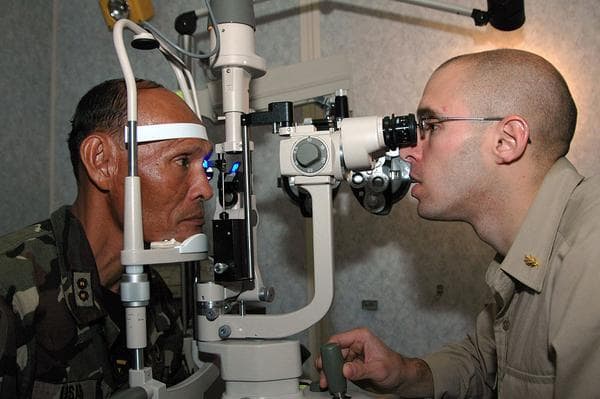Advertisement
Should Middle-Aged African Americans Be Screened For Glaucoma?

Just last week, my father was nagging me — wait, did I say nag? I meant remindingme — about the importance of being screened regularly for glaucoma. He recalled that his eye doctor once told him that if caught early, it's no problem; caught late, you can go blind.
So I noted with interest this study just out from the Massachusetts Eye and Ear Infirmary and elsewhere. It used computer modeling to calculate the costs and benefits of routinely screening African-American patients in their fifties for glaucoma, and concluded that it made economic and clinical sense, though its benefits were modest.
From the press release:
Boston (March 12, 2012) – Implementing a routine national glaucoma screening program for middle-age African American patients may be clinically effective; however its potential effect on reducing visual impairment and blindness may be modest, according to a computer-based mathematical model reported in the March issue of Archives of Ophthalmology, one of the JAMA/Archives journals.
Dr. Louis Pasquale, Co-Director of the Mass. Eye and Ear Glaucoma Center of Excellence, was the senior author on this paper.
“Primary open-angle glaucoma is a chronic, degenerative disease that affects more than 2.2 million Americans and 1.9 percent of Americans older than 40 years,” the authors write as background in the study. “The high prevalence of undiagnosed glaucoma contributes to visual loss, an outcome that is disproportionately common in African American individuals, where as many as 11 percent of elderly patients develop blindness.”
Using data from the Eye Diseases Prevalence Research Group and Baltimore Eye Study, Joseph A. Ladapo, M.D., Ph.D., then of Beth Israel Deaconess Medical Center and Harvard Medical School, Boston, now with NYU Langone Medical Center, New York, and colleagues, which include Dr. Pasquale, developed a microsimulation computer-based model to project visual outcomes among African American individuals screened for glaucoma under a national screening policy.
Based on the developed simulation model, the authors found that a universal, community-based glaucoma screening program for African American patients is potentially clinically effective; however, its overall potential effect on visual impairment and blindness appears relatively modest. The authors predict that a glaucoma screening program for African American patients between the ages of 50 and 59 years without known glaucoma would reduce the lifetime prevalence of undiagnosed glaucoma from 50 percent to 27 percent, the prevalence of glaucoma-related visual impairment from 4.6 percent to 4.4 percent, and would reduce the prevalence of glaucoma-related blindness from 6.1 percent to 5.6 percent.
The projected cost as outlined by the authors would be $80 per individual screened, considering only the cost of frequency-doubling technology and eye examinations to confirm the diagnosis. The number of patients needed to screen to diagnose one person with glaucoma was estimated at 58, and the number needed to screen to prevent one person from developing visual impairment was estimated at 875. The authors also note that they did not consider “the cost of visual rehabilitation, disability or long-term care in patients with blindness, which are substantial.”
“We conclude that routine screening for glaucoma in African American individuals is a potentially clinically effective and economical method to reduce the burden of glaucoma-related visual impairment and blindness, though its absolute benefit is likely to be modest,” the authors write. “Future studies should also consider long-term costs associated with treatment and the impact of delaying visual impairment on health-related quality of life.”
This program aired on March 13, 2012. The audio for this program is not available.
